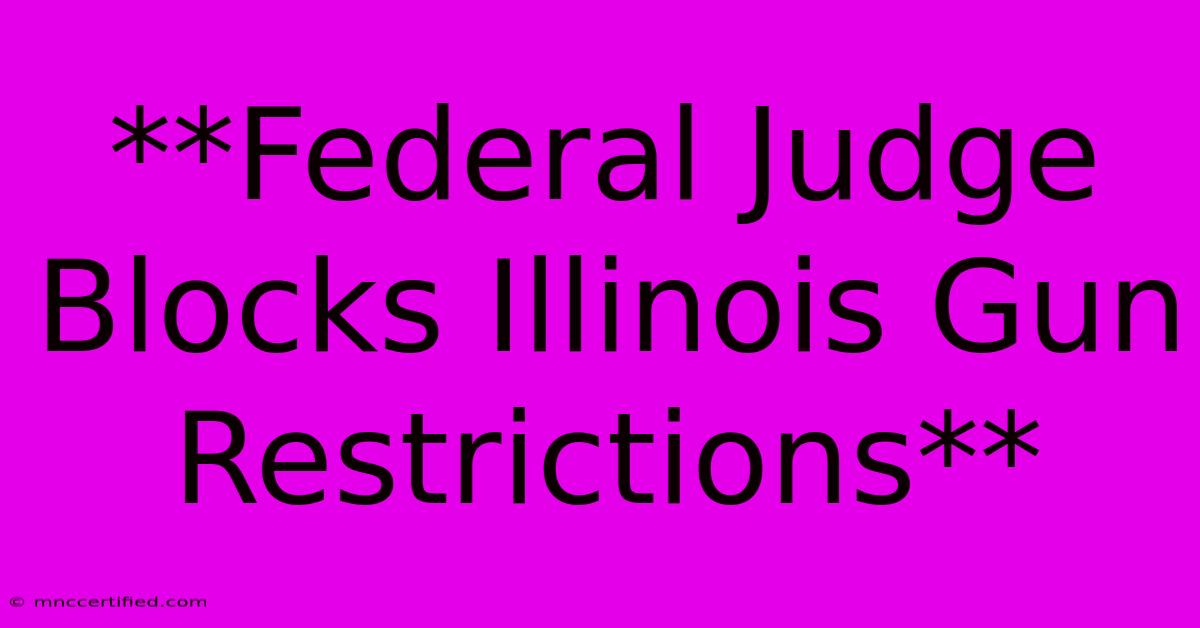**Federal Judge Blocks Illinois Gun Restrictions**

Table of Contents
Federal Judge Blocks Illinois Gun Restrictions: What This Means for Gun Owners and the Future of Gun Control
A federal judge in Illinois has issued a preliminary injunction blocking several state gun restrictions, a decision that has sparked debate and raised questions about the future of gun control in the state and across the country. The ruling, which came down on [date], temporarily prevents the enforcement of several key provisions in the SAFE-T Act, a sweeping gun control law passed by the Illinois legislature in 2021.
What Restrictions Are Blocked?
The judge's order specifically targets the following provisions of the SAFE-T Act:
- A ban on the sale of high-capacity magazines: The law originally prohibited the sale of magazines that hold more than 10 rounds of ammunition.
- A ban on the sale of assault weapons: The law classified certain semi-automatic firearms as "assault weapons" and prohibited their sale.
- A requirement for a FOID card to purchase ammunition: The law mandated that anyone wishing to purchase ammunition must possess a valid Firearm Owner's Identification (FOID) card.
These restrictions were challenged in court by a group of gun rights advocates who argued they violated the Second Amendment right to bear arms.
Arguments Presented in Court
The plaintiffs argued that the SAFE-T Act's restrictions were unconstitutional, claiming they infringe upon the fundamental right of individuals to own and use firearms for self-defense. They also argued that the law is overly broad and vague, making it difficult for citizens to understand which firearms and magazines are prohibited.
The state of Illinois argued that the restrictions are necessary to reduce gun violence and protect public safety. They pointed to the increasing rates of gun violence in the state and argued that the law is a reasonable attempt to address this growing public health crisis.
Implications of the Judge's Ruling
The judge's ruling has far-reaching implications for both gun owners and gun control advocates in Illinois. It provides a temporary reprieve for those who have been affected by the SAFE-T Act's restrictions and signals a possible shift in the legal landscape surrounding gun rights.
For gun owners:
- The ruling allows them to continue purchasing and possessing high-capacity magazines and certain semi-automatic firearms.
- It also exempts them from the requirement of having a FOID card to purchase ammunition.
For gun control advocates:
- The ruling is a setback in their efforts to curb gun violence in the state.
- It creates uncertainty about the future of the SAFE-T Act and other gun control measures.
What's Next for the SAFE-T Act?
The preliminary injunction issued by the federal judge does not permanently overturn the SAFE-T Act. The case is still ongoing, and the judge's decision is subject to appeal. The Illinois Attorney General has already announced their intention to appeal the ruling.
The outcome of the appeal will determine the future of the SAFE-T Act and its gun restrictions. This legal battle is likely to continue for some time, and the decision could have significant implications for gun control policies nationwide.
Beyond Illinois: National Implications
The case in Illinois is part of a larger national debate about the Second Amendment and the balance between gun rights and public safety. Similar challenges to gun control laws have been filed in other states, and the Supreme Court's recent rulings on gun rights have emboldened gun rights advocates.
The outcome of the legal challenges to the SAFE-T Act could set a precedent for gun control laws in other states and may influence the Supreme Court's future decisions on gun rights.
This ongoing legal battle is just one aspect of a complex and multi-faceted issue. The debate surrounding gun control is likely to remain a prominent topic in American politics and society for years to come.

Thank you for visiting our website wich cover about **Federal Judge Blocks Illinois Gun Restrictions**. We hope the information provided has been useful to you. Feel free to contact us if you have any questions or need further assistance. See you next time and dont miss to bookmark.
Featured Posts
-
California Insurance Bad Faith Statute
Nov 09, 2024
-
Ucla Edges Iowa 20 17 Game Recap
Nov 09, 2024
-
Commercial Insurance Renewal Checklist
Nov 09, 2024
-
Grammy Awards Beyonce Swift Lamar Lead Pack
Nov 09, 2024
-
How To Get Mc Donalds 1 Chicken Nuggets This Month
Nov 09, 2024